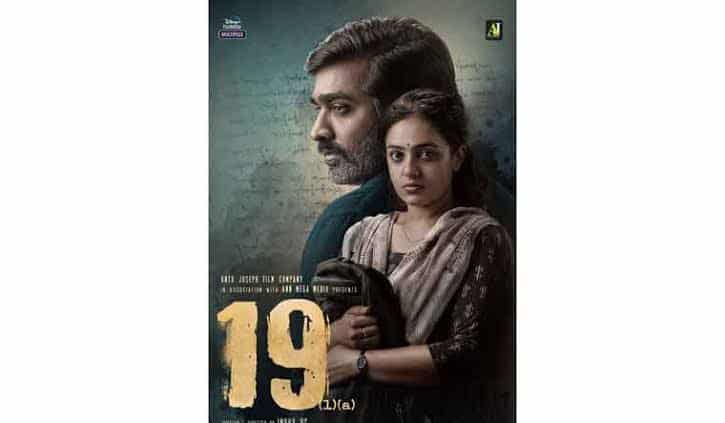
19(1)(a), written and directed by debutant Indhu V.S, is now streaming on Disney+ Hotstar. The movie takes us through the life of a young woman whose life changes after she is entrusted with a Tamil Ambedkarite revolutionary writer’s unpublished manuscript.
The title refers to Article 19(1)(a) of the Indian Constitution that ensures all citizens the right to freedom of speech and expression. With lead roles played by Vijay Sethupathi and Nitya Menen, 19(1)(a) seems to bring together a medley of characters who don’t always look like they’re part of the same movie. While a few portions such as father- daughter relationship work, the movie is let down by few red herrings like the scene between theinvestigative officer and the publisher, which really go nowhere.
Nitya Menen’s unnamed character is a single woman who runs her father’s Photostat and DTP store. She has a simple, mundane life: wake up, prepare and pack lunch, ride for work, deal with the old computer and power failure at the store, the occasional splurging on street food, send congratulatory messages on WhatsApp groups, go to sleep. She shares an empty house with her father and a despondency towards their future. The manuscript awakens her sense of responsibility, pushing her to do things which no one really expects her to do. Vijay Sethupathi’s character appears at her store one day and the next day she finds out that he’s shot dead. It is this shock to the mundanity of her life that catapults her into the realm of the political.
What struck me about her character development is how the writer-director restrains herself from presenting Menen’s character as a ‘victorious’ one who has outdone herself with her intention to do right by the murdered activist. When her personal bubble is burst, she really becomes aware of her part in other systems like media and the state. The encounter transforms her personal life by making her think of herself as a person with rights and someone who is capable of expression rather than just a photocopyist of other people’s expression. Her character reminds one of the silent rolesone takes up in life which may not make sense to others, but makes the person feel chosen and guidesthem well enough with its purpose, even if for a limited time. Little wins that no one knows of. The movie works best in these moments when we follow the protagonist absorbing the world around her at her characteristically contemplative pace. Along with the protagonist who is enviably emotionally balanced, we see equally interesting women on screen like her friend Fatima (Athulya Ashadam) who is the only company she’s got and journalist Jenny Philip (Arya Salim) who enables the protagonist in her journey. Srikant Murali plays the role of Gangettan, protagonist’s father.
The writer activist Gauri Shankar played by Vijay Sethupathi may remind his fans of the character Ranasingam from P. Virumaandi’s 2020 Tamil political drama Ka Pae Ranasingam, where again Sethupathi’s character dies and the female protagonist shoulders the bulk of the plot. While Ranasingam was combative, playful, tactful, loud and aggressive, all of which combined to create an image of a respectful and rustic conversationalist social activist, Gaurishankar in 19(1)(a) is an unconvincing stock writer activist type who is partly made relatable by the acting. Neither is his character distinctive nor is his ideology a coherent one. Indu V.S’s attempt to universalize the writer figure (as she says in an interview given to Sajin Shrijith ofCinema Express ) is caught up in platitudes. The motives for his murder are unclear and his literary voice in the movie is not compelling enough to live up to its importance in the script.
Very often in the movie, viewers are left with the feeling of having entered the wrong house and trying to observe the surroundings to make sense of what might have happened there previously for the present events to make sense. What we do associate it with and feel grief for are our own emotional scars from the past like the brutal murder of activist-journalist Gauri Lankesh. Indrajith Sukumaran plays the role of a successful publisher and Gauri Shankar’s friend Anand. The whole conversation in which he tries to dissuade Gauri Shankar from offering further provocation to his political enemies by writing ‘non-fiction’ feels shockingly ill-informed about literature and what it can accomplish.
Although the intentions and message behind Gauri Shankar’s last work Karuppu (Black) in the movie are well and good, and tries to add a dramatic and tragic punch to the plot, it overlooks the very need to address the question of caste beyond the western binaries like black and white skin. It is hard to believe that such a generic rendering of caste may constitute the provocation to kill off the writer activist character.
With cinema and entertainment business getting redefined post pandemic and pan-India release models, movies such as 19(1)(a) and those with low budget are opting for direct OTT release as it comes with more artistic freedom, a global audience and less box office pressure. It is doing good for the filmmakers and for the audience whose perceptions about cinema has had a paradigm shift in the recent past. A shift which extends to something far beyond the ‘prakrithi’ v/s mass social media debates about the present day Malayalam cinema.



